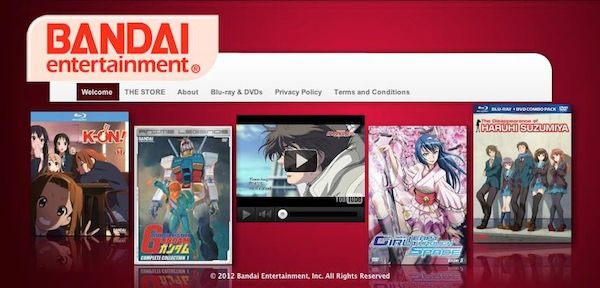The big news in anime and manga circles last week was the announcement that Bandai Entertainment will stop releasing new anime and manga. The current catalog will stay in print, and the company will focus on licensing its products to other companies, but three of its five employees have been laid off.
Like manga, the anime industry in the U.S. has been troubled for a long time, and it's tempting to blame this on piracy. Indeed, that's exactly what Charles Maib of Kotaku did. Maib admits he doesn't follow the anime and manga scene much any more, but that doesn't stop him from delivering some strong opinions. What Maib does know is what it was like to be an old-time otaku, when you made your own fansubs with love and VHS tapes and chewing gum and chicken wire (which may have been technically illegal but wasn't harming the industry at all), and also how much work it is to make your own content. Maib himself is a content creator, and he has a long paragraph where he explains all the steps you have to go through to make an animated cartoon.
And nobody seems to care. "Consumers have become selfish monsters who are strangling an industry that is already on its knees," he says, and he points the finger squarely at fansubbers and other pirates, and those who avail themselves of their services:
We created the beast, and we continue to feed it. We've reached the point that it's not uncommon for major websites to publish links to pirated content. Pirating has gone mainstream, and unless we as consumers have the fortitude to reverse our actions, allow the market to work as it should, and develop the patience to wait for new products to become available in our region, or even not become available, the face of the internet and digital media will change. It's inevitable.
First of all, this is not true, as those of us who have followed the anime and manga industry are well aware. Piracy has not gone mainstream. It exists, true, but it is not mainstream. In fact, the only major website I have seen that has knowingly published a link to pirated content is Kotaku itself, where another writer posted some scanlations of Skyward Sword—no, I'm not going to link to it—and got scolded it for it in the comments section. People do read scanlations, but as I pointed out a few days ago, they prefer not to, and if they really like the book, they buy it.
Also, I like how Maib thinks fans of a property should "develop the patience for new products to become available in our region." Sorry, the days of clipper ships are over, and anyone who thinks they can enforce regional controls is a chump. Anime blogger Justin of Organization Anti-Social Geniuses sums up neatly the reality that anime distributors ignore at their peril:
For better or worse, we’ve been moving in a “We must get it now” mode for the past couple years, and the days where we A)patiently wait for titles to come for us and B)buy actual copies of series despite their price are over.
If it's out there, and people want it, they will get it, from the publishers or from the pirates. Instead of blaming the consumer, publishers should be blaming themselves for not making the material available.
Over at Anime Diet, Michael Olivarez has a radically different take, and one that I think makes a lot more sense: The problem is structural. It's a long and eloquently written argument, but here's the gist: Most anime isn't good enough to justify the cost of distributing it via DVD and Blu-Ray:
Thus comes the fatal flaw in the anime as a hard media commodity scheme. The very idea that we [as] consumers are asked to pony up roughly 4-6 dollars per episode for a show that may not be worth a second viewing comes at odds with the movie collector’s mentality. The people ultimately know what they want, and will pay for it. The problem comes when we are inundated with the latest, and are essentially given no choice in between. When this happens, and our homes are buried with bricks of material that we cannot even give away- it presents a serious problem.
Olivarez is talking about anime here, but the same is most definitely true of manga. Back in the boom days, there were a lot of titles that simply weren't worth ten bucks, or the space they take up on the shelf. For a representative sampling, check out all the manga that are selling for a penny on Amazon.
Olivarez also mentions the choice of material, a point amplified by Rob Bricken of Topless Robot, who says that parent company Bandai Japan not only forced Bandai Entertainment to market 20-year-old Gundam anime, they forced BE to pay Cartoon Network to run it. That certainly rings true; much of that penny manga I just mentioned was translated not because the localizers were stupid but because the Japanese licensors forced them to take it—if you want this, then you must take that. Furthermore, the license-holders frowned on not finishing a series, even if it was tanking. One doesn't hear as much about this any more, so either the licensors aren't doing it as much or the U.S. publishers, of whom there are fewer now anyway, have stopped complaining about it.
While most manga publishers are independent companies, and can walk away from a license if it has too many conditions, Bandai Entertainment had to take orders from its Japanese parent company, Namco Bandai. Anime News Network interviewed Bandai Entertainment CEO Ken Iyadomi, who was clearly frustrated with the decisions coming from the home office:
"The pricing range for our products kept dropping in Western countries, and people tended only to buy sets with very reasonable prices, which we understand is what fans want, but it lead us to a different strategy than what Japanese licensors wanted," he remarked. "So we always had a problem [with licensors wanting something different than what consumers wanted]."
What it comes down to is this: It doesn't matter how much it costs you to make a product; you can only charge what the market will bear. The way out of this is to offer the iffy manga and anime at a low cost, which generally means digitally, and put the premium content onto physical media at a premium price. If people just want to get their weekly fix of some second-rate anime, but don't want a special edition to treasure forever, well, let them watch it via streaming media, sell some ads, and make some money you wouldn't have otherwise. This also solves the other structural problem in the anime industry, the delay in getting shows to foreign markets, because digital is obviously faster than physical distribution. Just as water seeks its own level, consumers will find what they want. The only question is whether they get it from publishers or pirates, and publishers have a lot more choice than they realize. Most of the people watching bootleg anime won't pay $30 for it anyway—that's not a lost sale. But put it online, throw in some ads, maybe paid memberships for the hard-core fans who want higher quality and fresher content, and now that anime is making money from new viewers.
Smart localizers are catching on. Crunchyroll, a former pirate site that has gone mainstream in the sense of going legit and paying its content providers, seems to be doing quite well with streaming anime. Digital Manga has formed the Digital Manga Guild, which publishes enjoyably trashy yaoi manga digitally for less than the cost of a print volume and keeps prices low by using amateur translators. Viz is making the boldest move of all, putting Shonen Jump magazine online at a relatively low price and posting episodes of the top six series in within two weeks of their Japanese debut. The speed scanners will still beat them to it—for now—but despite what Maib seems to think, manga and anime fans are basically decent and like to support the creators. Given a legitimate, inexpensive alternative, and a bit of education, many if not most will do the right thing.
Go back and look at that Tokyopop Facebook page I linked, and read the comments. There is a lot of tension between digital (by which they all mean bootleg) manga and physical copies. Readers use digital to read manga they can't afford or that is not available in their country. Often if they like a series, they will buy it in print. This is exactly how people consume media nowadays. They sample, then buy. They don't buy everything they sample, but if the samples are cut off, they won't buy any more—and they might buy less. This is the new reality, and all the scoldings in the world won't bring back the good old days. By ignoring this, and by charging champagne prices for a beer product, anime and manga companies are sinking their own ship, and they don't need the pirates to do it for them.




